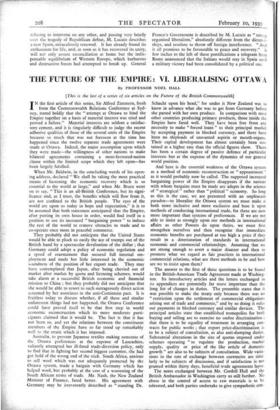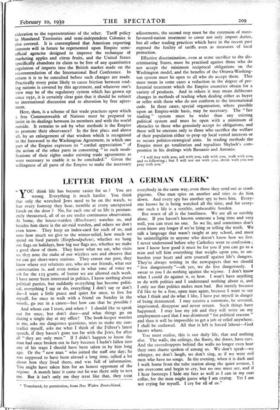THE FUTURE OF THE EMPIRE: VI.. LIBERALISING OTTAWA
By PROFESSOR NOEL HALL
[This is the last of a series of six articles on the Future of the British Commonwealth] IN the first article of this series, Sir Alfred Zimmem, fresh from the Commonwealth Relations Conference at Syd- ney, stated boldly that the "attempt at Ottawa to bind the Empire together on a basis of material interest was tried and proved a failure." Material interests are seldom a satisfac- tory cement, and it is singularly difficult to judge the recent adhesive qualities of those of the several units of the Empire because so much that was not foreseen at the time has happened since the twelve separate trade agreements were made at Ottawa. Indeed, the major assumption upon which they were made—the willingness of other nations to make bilateral agreements containing a most-favoured-nation clause within the limited scope which they left open—has been largely falsified.
When Mr. Baldwin, in the concluding words of his open- ing address, declared "We shall be taking the most practical means of hastening the economic recovery which is so essential to the world at large," and when Mr. Bruce went on to say, "This is an all-British Conference, but its signi- ficance and, as I trust, the benefits which will flow from it, are not confined to the British people. The eyes of the world are upon us today in hope and expectation," it is to be assumed that both statesmen anticipated that the Empire, after putting its own house in order, would find itself in a position to use its increased "bargaining power" to induce the rest of the world to remove obstacles to trade and to co-operate once more in peaceful commerce.
They probably did not anticipate that the United States would be able to pluck so easily the ace of trumps out of the British hand by a spectacular devaluation of the dollar ; that Germany could adopt a policy of economic regulation and a speed of rearmament that secured full internal em- ployment and made her little interested in the economic soundness of the position of her export trade. They may have contemplated that Japan, after being chevied out of market after market by quota and licensing scheme', would take alarm at a successful British economic and financial mission to China ; but, they probably did not anticipate that she would be able to resort to such outrageously direct action screened by her associates in the anti-Comintern pact. It is fruitless today to discuss whether, if all these and similar unforeseen things had not happened, the Ottawa Conference could have proved itself to be that first step in world economic reconstruction which its more moderate parti- cipants .claimed that it would be. The fact is that it has not been so, and yet the relations between the constituent members of the Empire have so far stood up remarkably well to the strain which it has imposed.
Australia, to prevent Japanese textiles making nonsense of the Ottawa preferences at the expense of Lancashire, valiantly attempted her ill-fated trade-diversion policy, only to find that in fighting her second biggest customer, slie had got hold of the wrong end of the stick. South Africa, anxious to sell wool which was not adequately protected by the Ottawa system, made a bargain with Germany which has helped wool, but probably at the cost of a worsening of the South African terms of trade. Mr. Nash, the New Zealand Minister of Finance, fared better. His agreement with Germany may be irreverently described as "standing Dr. Schacht upon his head," for under it New Zealand was to know in advance what she was to get from Germany before she parted with her own produce. In comparison with most other countries producing primary products, those inside the Empire have fared well. They have been free from any necessity to make "forced loans" to their principal market by accepting payment in blocked currency, and there have been no shiploads of unwanted aspirin or mouth-organs.
Their capital development has almost certainly been sus- tained at a higher rate than the official figures show. There has been a certain degree of passive defence of particular interests but at the expense of the dynamics of our general world position.
And here is the essential weakness of the Ottawa system as a method of economic reconstruction or " appeasement '' as it would probably now be called. The supposed increased bargaining power of the Empire disappears if the nations with whom bargains must be made are adepts in the science of " strategical " rather than " political " economy. So long as this is the case, we are presented with an unpleasant paradox—to liberalise the Ottawa system we must make it both more inclusive and more exclusive and base it upon methods of conducting international trade, for these are now more important than systems of preferences. If we are not able to insist as strongly upon our methods in international affairs as other Powers do upon theirs, we must first strengthen ourselves and then recognise that immediate economic benefits are purchased at too high a price if they result in a deterioration of standards in international economic and commercial relationships. Assuming that we are strong enough to avert a major disaster and then to promote what we regard as fair practices in international commercial relations, what are these methods to be and how are we to insist upon them?
The answer to the first of these questions is to be found in the British-American Trade Agreement made at Washing- ton. Its introductory articles and the letters exchanged in its appendices are potentially far more important than the long list of changes in duties. The preamble states that it was possible to make the treaty only because there was no "restriction upon the settlement of commercial obligations arising out of trade and commerce," and by so doing it rules out payments in blocked currency and similar devices. The principal articles state that established monopolies for both buying and selling are to exercise no undue discrimination ; that there is to be equality of treatment in arranging con- tracts for public works ; that export price-discrimination is to be a subject of consultation, as also anti-dumping duties.
Substantial alterations in the size of quotas imposed under schemes operating "to regulate the production, ,market supply, quality or price of the like article of domestic growth" are also to be subjects of consultation. Wide varia- tions in the rate of exchange between currencies are shni- larly to be subjects of discussion, and if satisfaction is not granted within thirty days, beneficial trade agreements lapse. The notes exchanged between Mr. Cordell Hull and the British Ambassador in Washington carry us still further. No abuse in the control of access to raw materials is to be tolerated, and both parties undertake to give sympathetic con- sideration to the representations of the other. Tariff policy in Mandated Territories and semi-independent Colonies is also covered. It is contemplated that American exporting interests will in future be represented upon Empire semi- official agencies designed to improve the technique of marketing apples and citrus fruits, and the United States specifically abandons its claim to be free of any quantitative regulation of imports into the British market made on the recommendation of the International Beef Conference. In return it is to be consulted before such changes are made Practically every point likely to cause friction between trad- ing nations is covered by this agreement, and whatever one's view may be of the regulatory system which has grown up since 1931, it is certainly clear gain that it should be subject to international discussion and to alteration by free agree- ment.
Here, then, is a scheme of fair trade practices upon which a free Commonwealth of Nations must be prepared to insist in its dealings between its members and with the world outside. It remains to ask by what methods is the Empire to promote their observance? In the first place and above all, by an enlargement of that wisdom which is recognised in the foreword to the Washington Agreement, in which one part of the Empire expresses its "cordial appreciation" of the action of the other parts in consenting "to such modi- fications of their rights under existing trade agreements as were necessary to enable it to be concluded." Given the willingness of all parts of the Empire to make the necessary adjustments, the second step must be the extension of most- favoured-nation treatment to cover not only import duties, but all other trading practices which have in the recent past exposed the futility of tariffs even as measures of local protection.
Effective discrimination, even at scme sacrifice to the dis- criminating States, must be practised against those who do not accept the minimum reciprocal obligations on the Washington model, and the benefits of the Ottawa-Washing- ton system must be open to all who do accept them. This must mean in some cases a reduction in the degree of pre- ferential treatment which the Empire countries obtain for a variety of products. And in others it may mean deliberate changes in methods of trading when dealing either as buyer or seller with those who do not conform to the international code. In these cases, special organisation, where possible upon an Empire-wide basis, may be necessary. The "fair trading" system must be wider than any existing political system and must be open with a minimum of obstacles to those who genuinely accept its obligations, and these will be onerous only to those who sacrifice the welfare of their population either to prop up local vested interests or to secure politico-strategical aims. In trading methods the Empire must go totalitarian and repudiate Shylock's com- promise in his dealings with Bassanio and Antonio.
"I will buy with you, sell with you, talk with you, walk with you, and so following ; but I will not eat with you, drink with you nor pray with you."















































 Previous page
Previous page